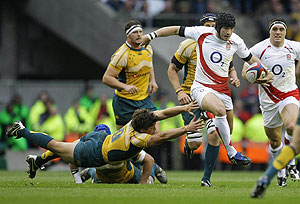
England's Danny Cipriani, right, runs with the ball. AP Photo/Matt Dunham
You heard it here first: England could be the best northern hemisphere side in next year’s Rugby World Cup. This fearless prediction (given England’s dire performance against Scotland several weekends ago) is based on two factors.
First, England’s generally good record at the RWC tournament, and second, England’s fine play in the first 20 minutes of play at Paris against France.
England have the third best record in the RWC tournament, after South Africa (two World Cups in four tournaments) and Australia (Australia two World Cups and a final in six tournaments), with three finals and a World Cup victory in 2007.
England, in fact, have made the final in the last two RWC tournaments, a fine achievement and a sign, I think, that the typical England rumbling style, played well, is hard to counter in knock-out games where the result is everything.
The Test against France at Paris on the weekend was a sort of knock-out type of match. France had to win to give the side a Grand Slam. England had to win to give the side its best Six Nations result since 2003.
In the first 20 minutes or so, England just over-whelmed France.
It reminded me a lot of how the side opened up in the 2007 quarter-final against Australia at Marseille. The big forwards rumbled the ball over the advantage line. The short side was punctured with some tough running. And then the ball was put wide through fast hands for Ben Foden to speed away for a terrific try.
Then heavy rain started to belt down.
England’s robust ball-in-hand game was given away for more of kicking and barging game. Even then, England made more breaks through Flood and Cueto than the French could put together.
My fearless prediction is predicated, however, on a couple of caveats.
The England pack looked very strong WITHOUT Steve Borthwick. If he is selected next season, then all bets are off.
All bets are off, too, if Mike Tindall is not in the side.
Tindall gave the England backline the bulk and know-how it has been lacking for some years. It was a surprise, and a turning point in the game, when he was substituted by the fragile Matthew Tait.
This brings us to another point about the England team: Martin Johnson is clearly out of his depth as a manager of the coaches.
The scrum, which should be a strong suit of the pack, was penalised heavily in the first half. It was only the advent of the old-timer Steve Thompson in the second half that rectified matters.
But Thompson is about as useful around the field as a car without tyres these days.
And the backs, especially the number 10s (Flood and Jonny Wilkinson), have no idea about the way to align. They stand far too deep, like all the European sides, with the exception of the excellent Stephen Jones (the number 10, not the journalist) of Wales.
You can’t consistently make the gain line with the number 10 standing back like a quarter back in the pocket.
This is Scotland’s problem with Dan Parks, a great kicker, standing so deep and playing without any energy, so that the rest of a likely backline are virtual sitting ducks waiting to be knocked over.
The basic rule of winning rugby is that the side that wins the battle of the advantage line will generally win the game.
An ignorance of this rule is the main reason why the top southern hemisphere sides (which understand the potency of the advantage line) have won five of the six World Cup tournaments.
If anyone doubts the truth of this assertion, then they should ask themselves why the line is called an “advantage line.”
Because of all this ignorance about back alignments and poor selections, I’d be happier with my prediction if the RFU brought in someone like Bob Dwyer. Dwyer understands all the elements of successful back play.
There is some talent in the England backline, but it won’t be unleashed if the running alignments and angles are all wrong.
My fearless prediction about England clearly downplays the chances of the other Six Nations sides, so a brief comment on them.
Italy hasn’t got any classy backs and the new tackle ball interpretations do not help their negative, hands-in-the-ruck game.
Scotland have a good lineout, a couple of strong-running forward, some handy backs and but no real brilliance or true mongrel of the Scottish teams of old.
Wales have some brilliant backs and a lot of confidence. Lee Byre reckons that Wales will knock-off the All Blacks later this year. But like Scotland, Wales lacks the mongrel aspect to its play that truly successful sides need.
Ireland’s RWC year was 2007. They blew it then. A great team is now getting old. The fact that John Hayes, a prop who can’t scrum, has recorded 100 caps, the first Irish player to achieve this, suggests a lack of depth in the engine room players. Ireland, too, have generally performed poorly at RWC tournaments.
France? They are the Grand Slam champions and they have played some brilliant rugby this season. They have a great pack and some pace and skill on the wings. But they look weak in the halves. They froze against England and were lucky that the rain bucketed down.
There is always the temperament issue with the French. They are capable of upsets (ask Australia 1987 and New Zealand 1999 and 2007). But France generally find it difficult when they reach the RWC final. The two biggest victories in the final (1987 and 1999) have been scored against French sides.
The history of the RWC is that the favourites sometimes fall away and sides not generally rated come through strongly.
Right now, England fall into the category of a ‘not generally rated’ side and, therefore, a candidate for a fearless prediction.





























































































